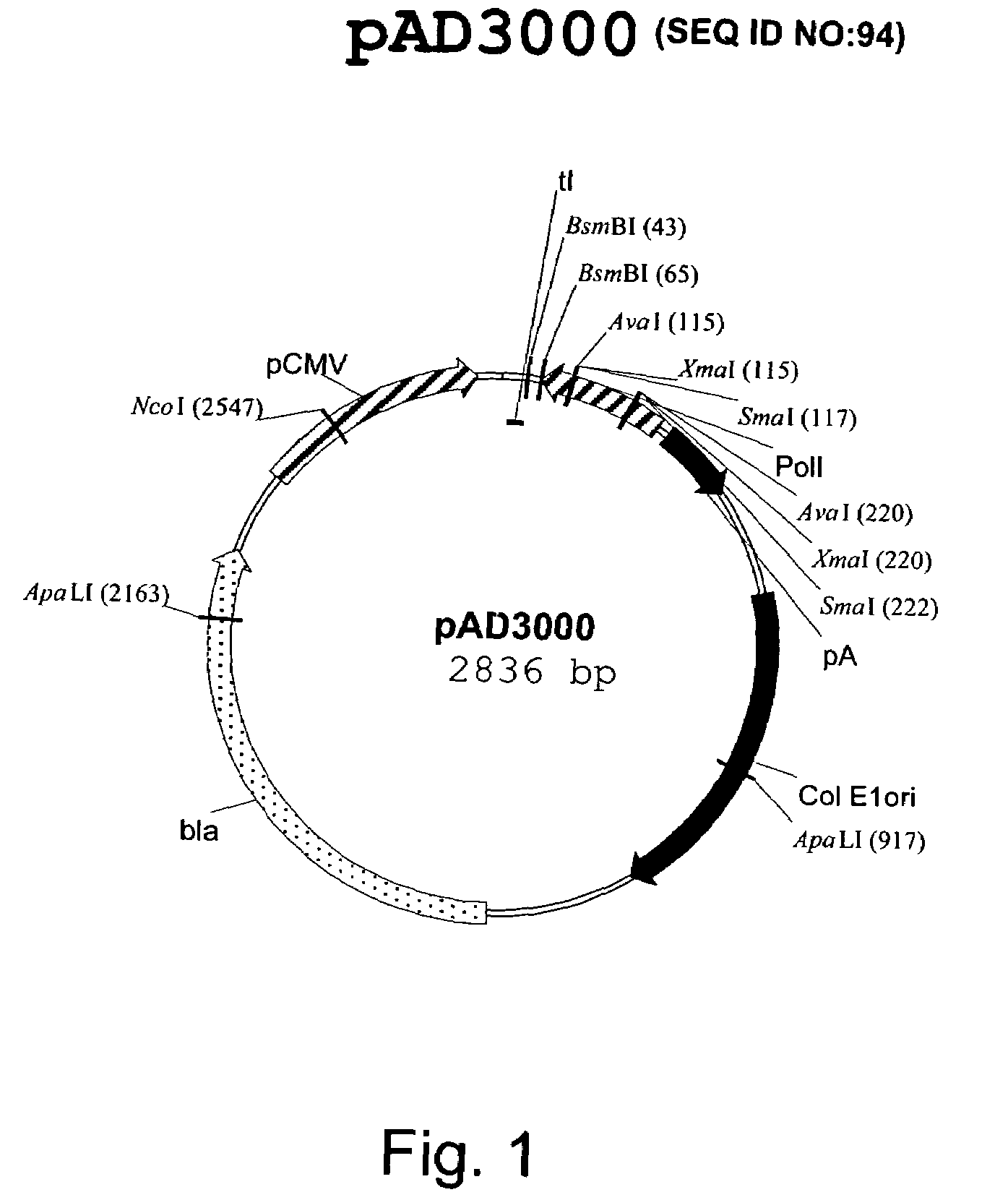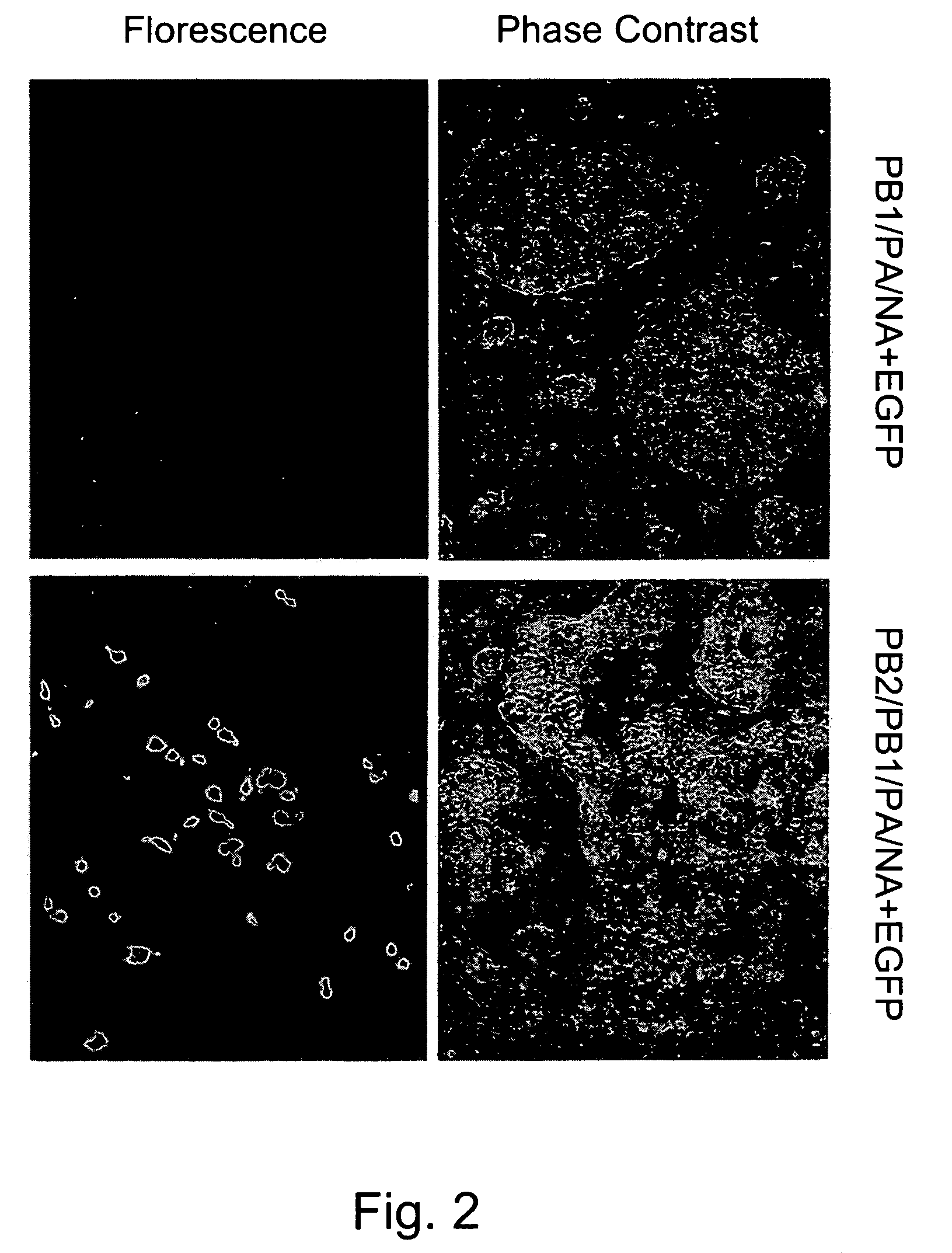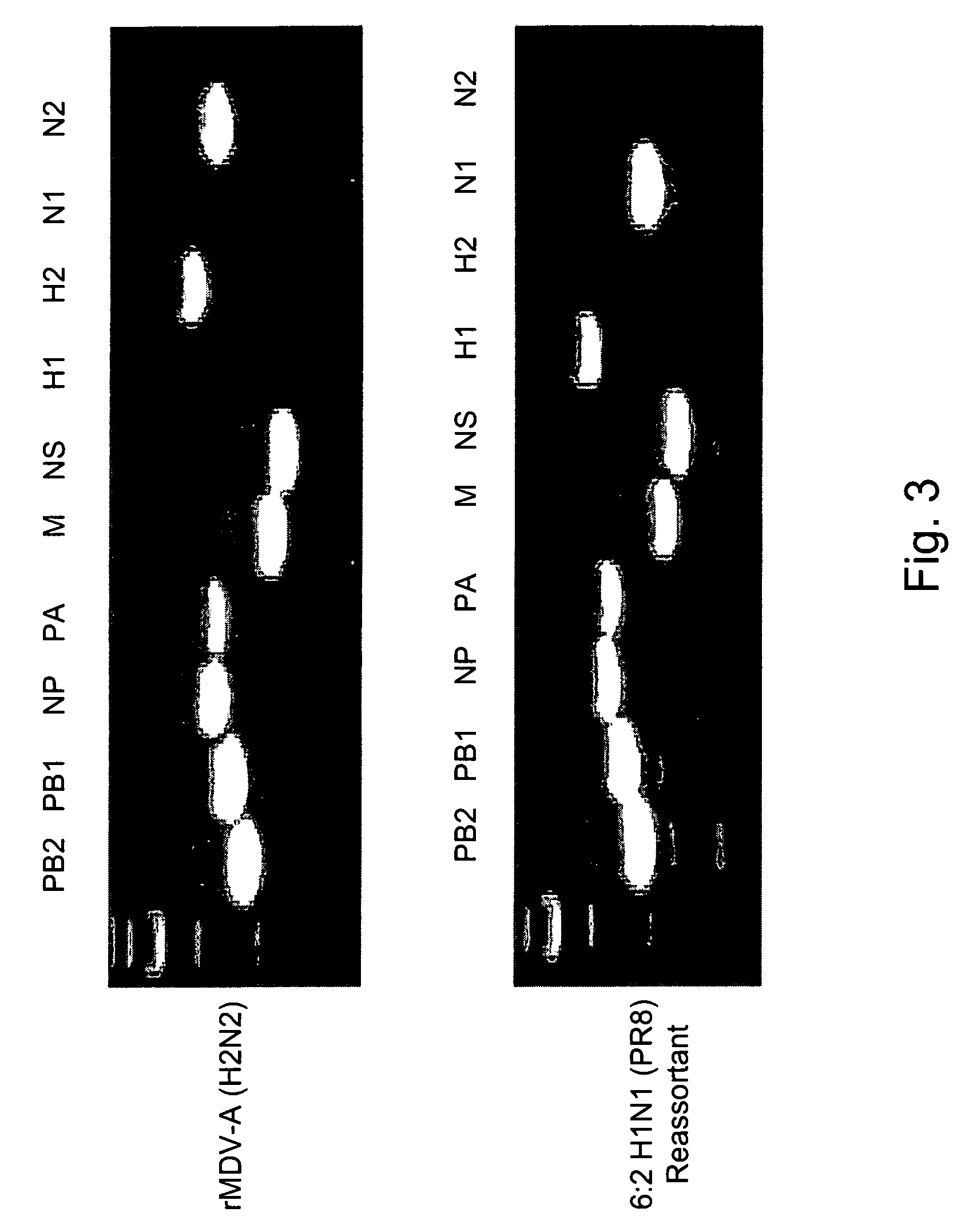Multi plasmid system for the production of influenza virus
a technology of influenza virus and plasmid system, which is applied in the field of multi-plasmid system for the production of influenza virus, can solve the problems of limiting flexibility, delays and shortages in production and distribution, virus does not replicate in the lungs of infected ferrets, etc., and achieves enhanced replication ability, modulating ha receptor binding activity and/or na neuramimidase activity, and improving replication
- Summary
- Abstract
- Description
- Claims
- Application Information
AI Technical Summary
Benefits of technology
Problems solved by technology
Method used
Image
Examples
example 1
Construction of pAD3000
[0173]The plasmid pHW2000 (Hoffmann et al. (2000) A DNA transfection system for generation of influenza A virus from eight plasmids Proc Natl Acad Sci USA 97:6108-6113) was modified to replace the bovine growth hormone (BGH) polyadenylation signals with a polyadenylation signal sequences derived from Simian virus 40 (SV40).
[0174]Sequences derived from SV40 were amplified with Taq MasterMix (Qiagen) using the following oligonucleotides, designated in the 5′ to 3′ direction: polyA.1:
[0175]
AACAATTGAGATCTCGGTCACCTCAGACATGATAAGA(SEQ ID NO:1)TACATTGATGAGTpolyA.2: TATAACTGCAGACTAGTGATATCCTTGT(SEQ ID NO:2)TTATTGCAGCTTATAATGGTTA
[0176]The plasmid pSV2His was used as a template. A fragment consistent with the predicted 175 bp product was obtained and cloned into pcDNA3.1, using a Topo TA cloning vector (Invitrogen) according to the manufacturer's directions. The desired 138 bp fragment containing the SV40 polyadenylation signals was excised from the resulting plasmid wit...
example 2
Eight Plasmid System for Production of MDV-A
[0177]A cold-adapted influenza virus type A strain A / AA / 6 / 60 variant has commonly been used as a master donor virus for the production of nasally administered Influenza A vaccines. This strain is an exemplary Master Donor Virus (MDV) in the context of the present invention. For simplicity, this strain A / AA / 6 / 60 variant is designated herein MDV-A. MDV-A viral RNA was extracted using the RNeasy mini kit (Qiagen) and the eight corresponding cDNA fragments were amplified by RT-PCR using the primers listed in Table 1.
[0178]
TABLE 1Sequence of the primers used for cloning MDV-A eight segmentsSEQID NO.PrimerSequence (5′-3′)MDV-A FORWARD PRIMERS3Aarl PB2 longCAC TTA TAT TCA CCT GCC TCA GGG AGC GAA AGC AGG TC4BsmBI-PBITAT TCG TCT CAG GGA GCG AAA GCA GGC AAA5BsmBI-PATAT TCG TCT CAG GGA GCG AAA GCA GGT ACT6BsmBI-NPTAT TCG TCT CAG GGA GCA AAA GCA GGG TAG A7AarI HA-longCAC TTA TAT TCA CCT GCC TCA GGG AGC AAA AGC AGG GG8BsmBI-NATAT TCG TCT CAG GGA GCA AA...
example 3
Generation of Infectious Recombinant MDV-A and Reassorted Influenza Virus
[0184]Madin-Darby canine kidney (MDCK) cells and human COS7 cells were maintained in modified Eagle Medium (MEM) containing 10% fetal bovine serum (FBS). Human embryonic kidney cells (293T) were maintained in Opti-MEM I (Life Technologies) containing 5% FBS. MDCK and either COS7 or 293T cells were co-cultured in 6-well plates at a ratio of 1:1 and the cells were used for transfection at a confluency of approximately 80%. 293T and COS7 cells have a high transfection efficiency, but are not permissive for influenza virus replication. Co-culture with MDCK cells ensures efficient replication of the recombinant viruses. Prior to transfection, serum-containing media were replaced with serum free medium (Opti-MEM I) and incubated for 4-6 hours. Plasmid DNA transfection was performed using TransIT-LT1 (Mirus) by mixing 1 μg of each of the 8 plasmid DNAs (PB2, PB1, PA, NP, M, NS, HA and NA) with 20 μl of TransIT-LT1 dil...
PUM
| Property | Measurement | Unit |
|---|---|---|
| temperature | aaaaa | aaaaa |
| temperature | aaaaa | aaaaa |
| temperature | aaaaa | aaaaa |
Abstract
Description
Claims
Application Information
 Login to View More
Login to View More - R&D
- Intellectual Property
- Life Sciences
- Materials
- Tech Scout
- Unparalleled Data Quality
- Higher Quality Content
- 60% Fewer Hallucinations
Browse by: Latest US Patents, China's latest patents, Technical Efficacy Thesaurus, Application Domain, Technology Topic, Popular Technical Reports.
© 2025 PatSnap. All rights reserved.Legal|Privacy policy|Modern Slavery Act Transparency Statement|Sitemap|About US| Contact US: help@patsnap.com



